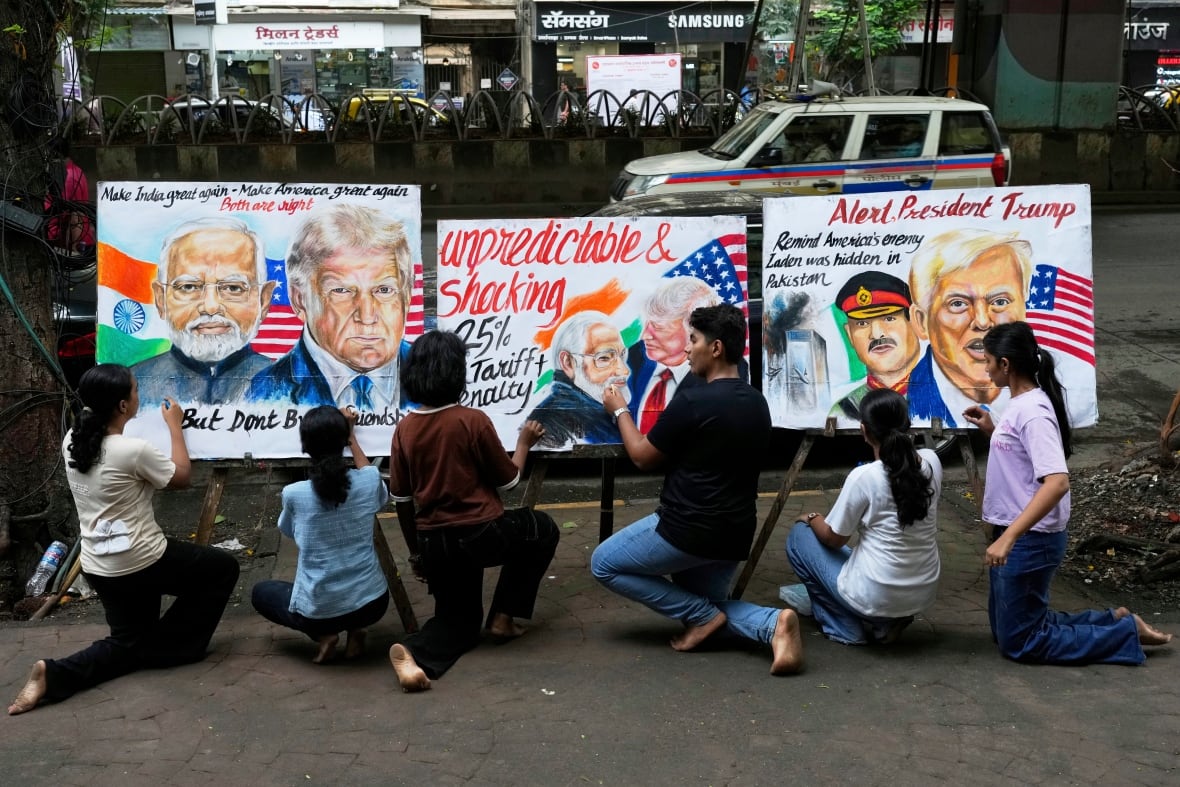
Trump's tariff threats inspire an 'Elbows Up' movement in India — minus the hockey
Published: 2025-08-15 22:13:29 | Views: 6
As It HappensIndian lawmaker calls for boycott of U.S. goods as Trump threatens tariffs
If U.S. President Donald Trump thinks he can push India around, he's got another thing coming, says Ashok Kumar Mittal.
Mittal, a member of Parliament in India's upper house, is one of several lawmakers and business leaders in India calling on people to boycott American products in response to the U.S. president's tariff threats.
"It will be effective," Mittal told As It Happens guest host Aarti Pole. "Indians are very patriotic."
Earlier this month Trump vowed to impose an additional 25 per cent tariff on Indian goods on Aug. 27, citing the country's continued imports of Russian oil. That would raise duties on some Indian exports to as high as 50 per cent.
The U.S. president has issued similar threats to other countries who buy Russian oil, in a bid to exert pressure on Russia to end its war in Ukraine.
"How can he think if he can put these tariffs on the products exported to U.S.A. from India, we will come under pressure?" Mittal said. "India will never come under any kind of pressure by anyone."
'A call for nationalism'
India, the world's most populous nation and fourth largest economy, is a key market for American brands.
It's the biggest market by users for Meta's WhatsApp. Domino's has 2,000 restaurants there, making India its second largest market after the U.S. And beverages like Pepsi and Coca-Cola often dominate store shelves.
But since Trump's threat, there's a growing chorus to buy local.

Manish Chowdhary, co-founder of India's Wow Skin Science, shared a video message on LinkedIn urging support for farmers and startups to make "Made in India" a "global obsession," and to learn from South Korea whose food and beauty products are famous worldwide.
"We have lined up for products from thousands of miles away. We have proudly spent on brands that we don't own, while our own makers fight for attention in their own country," he said.
Rahm Shastry, CEO of India's DriveU, an on-call driver service, wrote on LinkedIn: "India should have its own home-grown Twitter/Google/YouTube/WhatsApp/FB — like China has."
Prime Minister Narendra Modi hasn't explicitly addressed the tariffs publicly, but is advocating loudly for Indian self-reliance.
"I want our traders, shopkeepers to display boards for Swadeshi products," Modi said during an Indian Independence Day address on Friday, using the Hindi word for made-in-India goods.
The Swadeshi Jagran Manch group, which is linked to Modi's Bharatiya Janata Party, organized small public rallies across India on Sunday, urging people to boycott American brands.
"This is a call for nationalism," said Ashwani Mahajan, a spokesperson for the group.
Taking a page out of Canada's playbook
The surge of nationalism mirrors Canada's response to its ongoing trade war with the U.S., which has been dubbed "Elbows Up," a reference to hockey legend Gordie Howe, who wielded his elbows like weapons on the ice.
Many Canadians have eschewed American products for ones made in Canada. Canadian travel to the U.S. is also way down, with some snow birds going as far as to sell their American properties.
Meanwhile, Prime Minister Mark Carney — who leveraged "Elbows Up" in his election campaign — has also pushed through legislation to fast-track what he calls "nation-building" projects, even in the face of opposition from Indigenous leaders and environmental advocates.
These Canadian tactics have not gone unnoticed in the U.S.
Just this week, Kentucky Sen. Rand Paul, a Republican, lamented during an interview with Fox News that Trump's trade war has Canadian businesses taking Kentucky bourbon off the shelves to the detriment of his constituents.
Mittal says he appreciates the "Elbows Up" movement in Canada, which he says is "compelling U.S. senators to guide their president to think again."
"Similarly, if India does that, I hope a good advisor of Mr. Trump will also guide him not to resort to this kind of tactics upon India," he said.
Not everyone's sold on the boycott
Mittal says Indians have historically refused to bow to outside pressure from the U.S. or anyone else, citing the Swadeshi Movement, in which Indians under British rule boycotted British products to protest the 1905 partition of Bengal.
"If Indians decide to boycott, they will do it wholeheartedly," he said.
But it remains to be seen whether Indian residents are really on board. So far, there is no immediate indication of U.S. sales taking a hit.
Rajat Gupta, 37, who was dining at a McDonald's in the Uttar Pradesh state capital Lucknow last week, told Reuters he wasn't concerned about the tariff protests.
He said he simply enjoys his McPuff, a pastry available on McDonald's menu in India, and 49-rupee ($0.77 Cdn) coffee, which he considered good value for money.
"Tariffs are a matter of diplomacy and my McPuff [and] coffee should not be dragged into it," he said.
Source link





